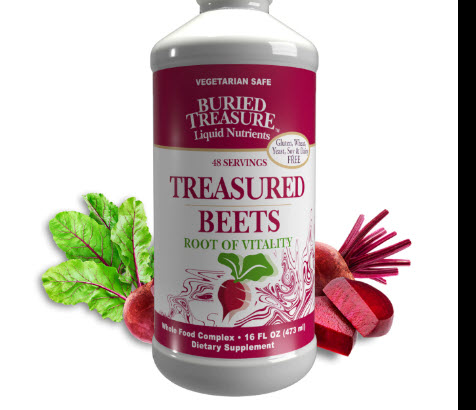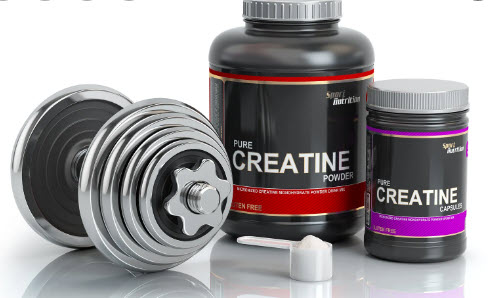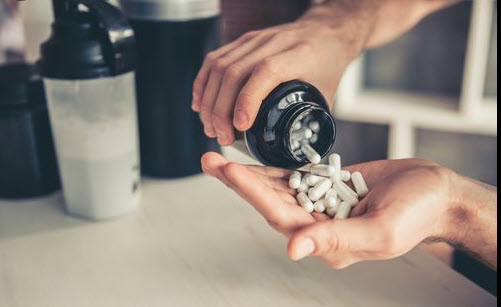4-May cause digestive upset:

Several components in pre-workout formulations have the potential to irritate your stomach.
Sodium bicarbonate, magnesium, creatine, and caffeine are among them.
When taken in doses of 91–227 mg per pound of body weight (200–500 mg per kg), sodium bicarbonate can cause issues. On the other hand, most pre-workout pills do not contain as much.
On the other hand, magnesium has laxative properties, particularly when taken in the form of magnesium citrate. As a result, taking too much may result in diarrhea.
Interestingly, mixing pre-workout vitamins with too little water might irritate your stomach. A beverage that is too concentrated can cause diarrhea.
Methods for reducing side effects
li can minimize side effects by mixing your pre-workout pill with 8–12 ounces (240–350 ml) of water.
Because determining which ingredient is causing digestive problems might be tricky, you may want to experiment with different pre-workout mixes until you discover one you can stomach.
5-May cause headaches:

Citrulline, which is found in several pre-workout supplements, is thought to improve muscle growth by increasing blood flow to your muscles during exercise.
This amino acid works by increasing the amount of nitric oxide in your circulation (19Trusted Source).
Citrulline malate, a standard version of this substance, is recommended in doses of 6–8 grams, while many pre-workout supplements contain more negligible levels, which may not deliver the same advantages.
Keep in mind that increased blood flow affects both your brain and your muscles, causing headaches and migraines in some people. This is caused by variations in blood pressure in your brain’s tiny blood vessels.
Methods for reducing side effects
The most efficient strategy to eliminate citrulline headaches is to reduce your dosage.
If you’re still getting headaches, look for a pre-workout pill that doesn’t contain this component.
5 Benefits of Taking Supplements Before You Workout:

Carbohydrates, caffeine, beet juice, creatine monohydrate,
and beta-hydroxy-beta-methyl butyrate is a few common pre-workout supplement ingredients demonstrated to boost exercise performance (HMB).
Here’s a quick rundown of what the research suggests they could accomplish for you.
1-Carbohydrates

Carbs help for obvious reasons: they’re your body’s primary source of energy, and they’re what experts recommend eating before a workout to feed your body adequately.
“Evidence supports a range of carbohydrate uses for various athletic applications, from taking in 30 to 60 grams per hour during endurance events to simply rinsing the mouth with a carbohydrate solution before sprint events,” says Georgie Fear, R.D., C.S.S.D., a board-certified sports dietitian with One by One Nutrition.
After all, your body uses blood glucose and glycogen (stored carbs) as its primary energy source. At the same time, you exercise—especially at high intensities like boot camps, indoor cycling classes, and lifting sessions. As a result, topping up your levels before starting your activity will help you have more energy and perform better.
2-Caffeine:

Caffeine, on the other hand, it is a stimulant that boosts energy and alertness,
and studies show that it can also help athletes perform better.
Although several studies used small sample sizes,
there is substantial evidence supporting caffeine’s capacity to boost workout performance.
Caffeine administration may improve aerobic endurance, muscle strength, muscle endurance, leaping performance, and speed, according to a 2020 review of 21 previously published meta-analyses. According to the review,
you’d need to ingest between three and six milligrams of caffeine per kilogram of body weight (204–408 mg of caffeine for a 150-pound person) for caffeine to work as a performance booster.
Still, the authors caution that more research must be done on women and older individuals to ensure the results. can be generalizable.
3-Beetroot juice:

Beetroot juice has been demonstrated to enhance the body’s levels of nitric oxide—a natural vasodilator that opens blood vessels and improves blood flow—and enhance cardiovascular performance, according to a 2017 assessment of relevant studies.
Plus, according to a 2020 study published in the International Journal of Sports Physiology and Performance,
persons who took a beetroot supplement before a 30-second all-out cycling sprint test produced more power and felt less exertion than those who didn’t.
While it’s crucial to keep in mind that beet research is still in its infancy, and most studies are small, all of them have yielded promising results.
4-Creatine monohydrate

Creatine monohydrate is commonly seen in pre-workout supplements.
Creatine is a three-amino-acid derivative created naturally in the body and stored in the muscles as a source of rapid energy. According to Ansari,
creatine can help you expend more effort throughout your workout, particularly during high-intensity intervals, stimulating more remarkable muscle growth.
While studies demonstrate that supplementing with large doses helps improve muscle mass and strength over time,
it’s not strictly a pre-workout because the timing doesn’t matter. Fear recommends taking creatine monohydrate pre-workout, post-workout,
or at 8:49 p.m. Some study even suggests that taking creatine monohydrate after each workout,
rather than before, is more beneficial at improving exercise performance since your body is more likely
to absorb and store it after workouts when your natural levels are depleted.
Over the last 20 years, creatine has been one of the most thoroughly examined sports supplements, with studies continuously demonstrating that in regular doses
—three to five grams per day overtime—is very safe for healthy adults.
(It’s also connected to better cognition, reduced depression risk, and a lower chance of heart disease.)
Weight gain from water retention is the most prevalent side effect;
while your muscles absorb creatine,
they also store water.
This can make your muscles appear more significant and make you weigh a little more.
Suppose you take too much at once or without being adequately hydrated.
In that case,
you may experience gastrointestinal upset and muscle cramping,
but studies looking at daily creatine supplementation for up to a year revealed no adverse effects.
However, if you have diabetes,
kidney difficulties, or any other serious health condition,
you should consult your doctor before using creatine supplements regularly (or anything, really).


